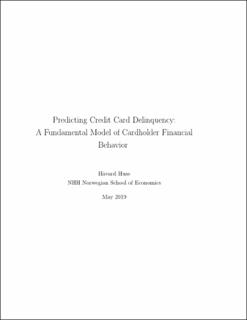Predicting Credit Card Delinquency: A Fundamental Model of Cardholder Financial Behavior
Doctoral thesis
Permanent lenke
https://hdl.handle.net/11250/2640771Utgivelsesdato
2019-11Metadata
Vis full innførselSamlinger
Sammendrag
This thesis proposes a model of credit card customer delinquency based on
theoretical advancements in financial decision-making. As follows, this thesis
has two main research purposes.
First, credit card delinquency is modeled explicitly, incorporating mechanisms
from mental accounting and financial decision-making. This allows
for more realistic modeling of cardholder behavior, while simultaneously inspecting
the validity of these theoretical concepts.
Second, the modeling specification advances previous research in the
behavior scoring literature. Accounting for individual-level heterogeneity,
dynamic effects are assigned as individual lag weights using a segmented
approach. Hence, potentially different behavioral patterns between non-delinquent
and eventual delinquent cardholders are modeled directly.
Using a comprehensive dataset combining credit and debit transactions
of cardholders between June 2008 and June 2011 from a Norwegian bank,
support is found for the following three hypotheses related to mental accounting
and present bias. First, increased payment decoupling leads to a higher
likelihood of delinquency, when continued borrowing is promoted by reduced
salience of past expenses. Second, the results show that behavior consistent
with persistence of decision-making ineptitude also increases the likelihood
of delinquency. Some cardholders habitually spend excessively, refusing to
accommodate consumption to a financially reasonable level. Third, a lower
concern for future consequences also increases the likelihood of delinquency.
Present-biased individuals tend to discount future credit card repayments at
a higher rate and consistently spend at perilously high rates.
Further, the results reveal how the structure of dynamic effects improves
prediction of delinquency. Capturing the heterogeneous effects of previous
financial status leads to a more precise understanding of cardholder behavior.
The proposed model has greater predictive performance than machine
learning algorithms that are frequently applied to credit scoring data.
